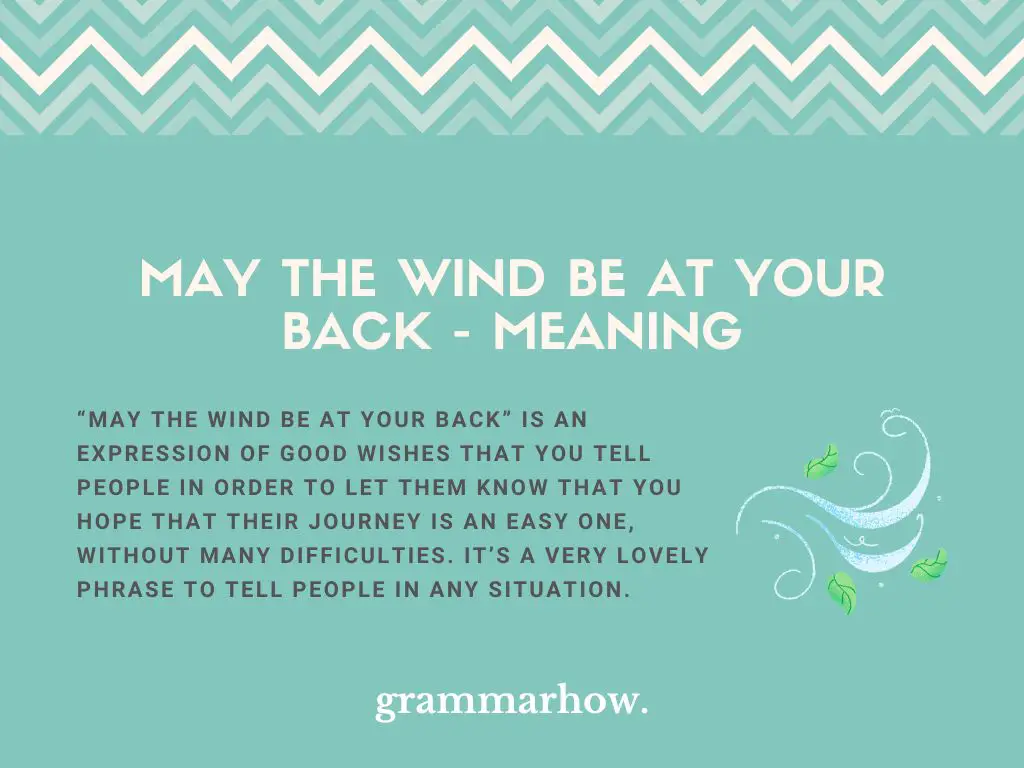“May the wind be at your back” seems like a phrase that carries a positive sentiment, but it’s difficult to be certain. What does “may the wind be at your back” actually mean? And how could you use it on your own? This article will answer all of these questions.
May the Wind Be at Your Back – Meaning
“May the wind be at your back” is an expression of good wishes that you tell people in order to let them know that you hope that their journey is an easy one, without many difficulties. It’s a very lovely phrase to tell people in any situation.

When you use “may the wind be at your back”, you’re telling the person that you hope that they never encounter large struggles or difficulties, and that they deserve to have an easy journey.
It’s a very poetic way to wish someone well, and can be incredibly useful because of that exact fact, as you’re wishing people success in a very intricate and delicate way.
How to Use “May the Wind Be at Your Back ” in a Sentence
“May the wind be at your back” might seem like a very specific expression, but in truth it’s a very earnest and straightforward expression of good wishes. Here are some example sentences that demonstrate how to use “may the wind be at your back” so that you can use it:
- May the wind be at your back no matter what, and I wish you a great journey.
- May the wind be at your back and the sun upon your face, and always remember I’m with you.
- May the wind always be at your back in any situation, and may the road be an easy one.
- May the wind be at your back, and may the road rise to meet your feet in any situation.
- May the wind be at your back, and I hope that the next time we meet, you’ve made it to your goal.
- Farewell my good friend, and may the wind be at your back wherever it is you may go.
- I’ll see you in a few years, but for now, may the wind be at your back through your entire journey.
May the Wind Be at Your Back – Origin
“May the wind be at your back” is a phrase that comes from a Celtic expression of good wishes that starts “May the road rise to meet you, may the wind be at your back, may the sun shine warm upon your face…”. It’s a culturally-unique way to wish well.
The part about the wind being at your back most likely comes from the fact that when sailing a ship, you want the wind to be at your back, so it pushes your ship forward.
There are plenty of other similar Celtic expressions such as “may trouble be a stranger to you” that express the same broad sentiment of well-wishes.
May the Wind Be at Your Back – Synonyms
“May the wind be at your back” is quite simply a culturally-specific way to wish someone well in their life. Naturally, there are plenty of other phrases that fulfill this exact same purpose. Here are some synonym phrases that also express this exact same core idea:
- May trouble always be a stranger to you
- May your chimney continue to smoke for a long time
- May the roach ahead always be without traffic or obstacles
- May the road rise to meet your feet
Correct Ways to Say “May the Wind Be at Your Back ”
Though the phrase originates from a longer Celtic salutation, the phrase “may the wind be at your back” has certainly seen its good share of variations over the years, all equally valid in their construction. Here are some correct ways to say “may the wind be at your back”:
- May the wind never go against you
- May the wind always be at your back
- May the wind always be an ally to you
- May the wind lead you to different places
Incorrect Ways to Use “May the Wind Be at Your Back ”
“May the wind be at your back” is an expression that should be used as a way to give someone your best wishes. An incorrect use for this phrase is to imply it negatively, as in “may you miss the wind no matter what you do”.
This is an illogical thing to do, as not only is the expression designed to express a good sentiment, but also the wind being at your back is a good thing.
In What Situations Can You Use “May the Wind Be at Your Back ”?
“May the wind be at your back” is an expression that can be used to let people know that you hope they have a good, easy journey ahead of them. This makes it a perfect expression to use when saying goodbye to someone.
In particular, it’s a very fitting phrase to use when saying goodbye to someone for presumably a long time, with both of your paths diverging, as you’re hoping that their path treats them well.

Martin holds a Master’s degree in Finance and International Business. He has six years of experience in professional communication with clients, executives, and colleagues. Furthermore, he has teaching experience from Aarhus University. Martin has been featured as an expert in communication and teaching on Forbes and Shopify. Read more about Martin here.
